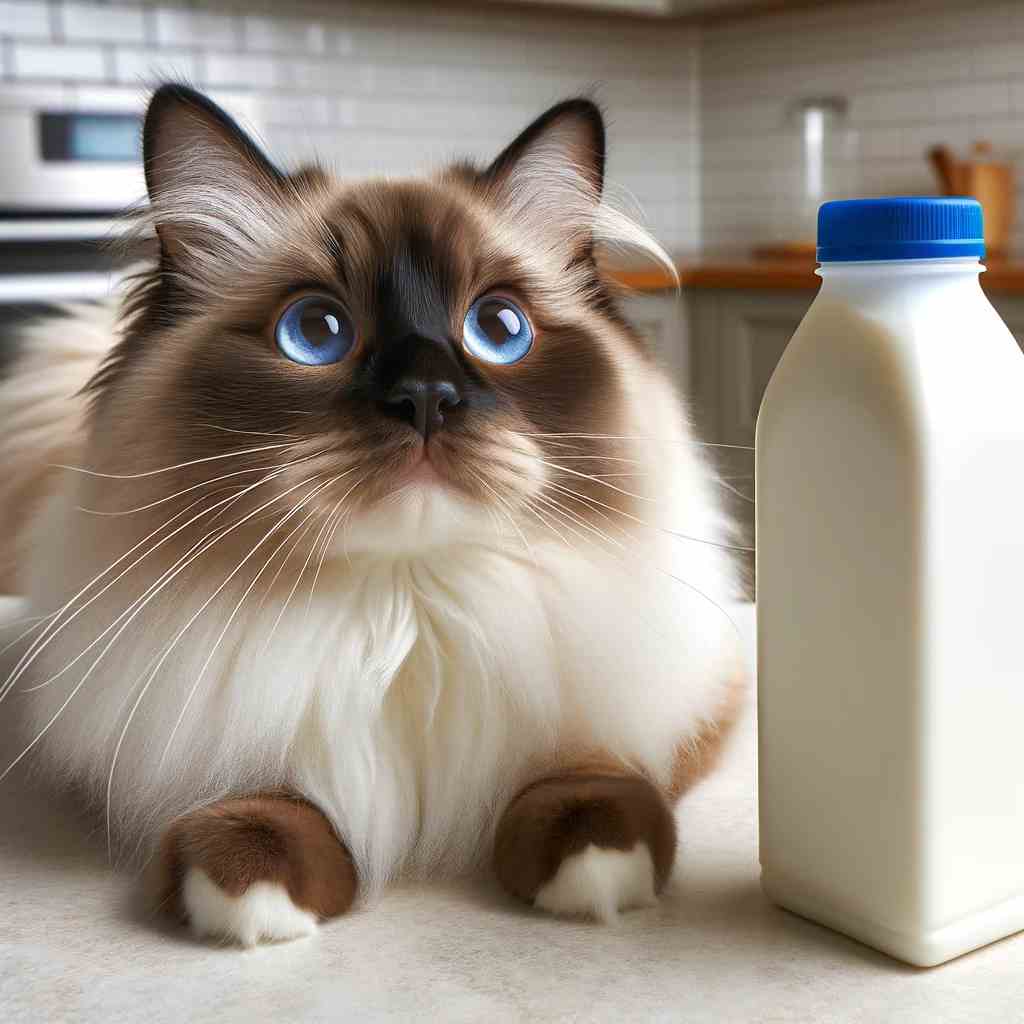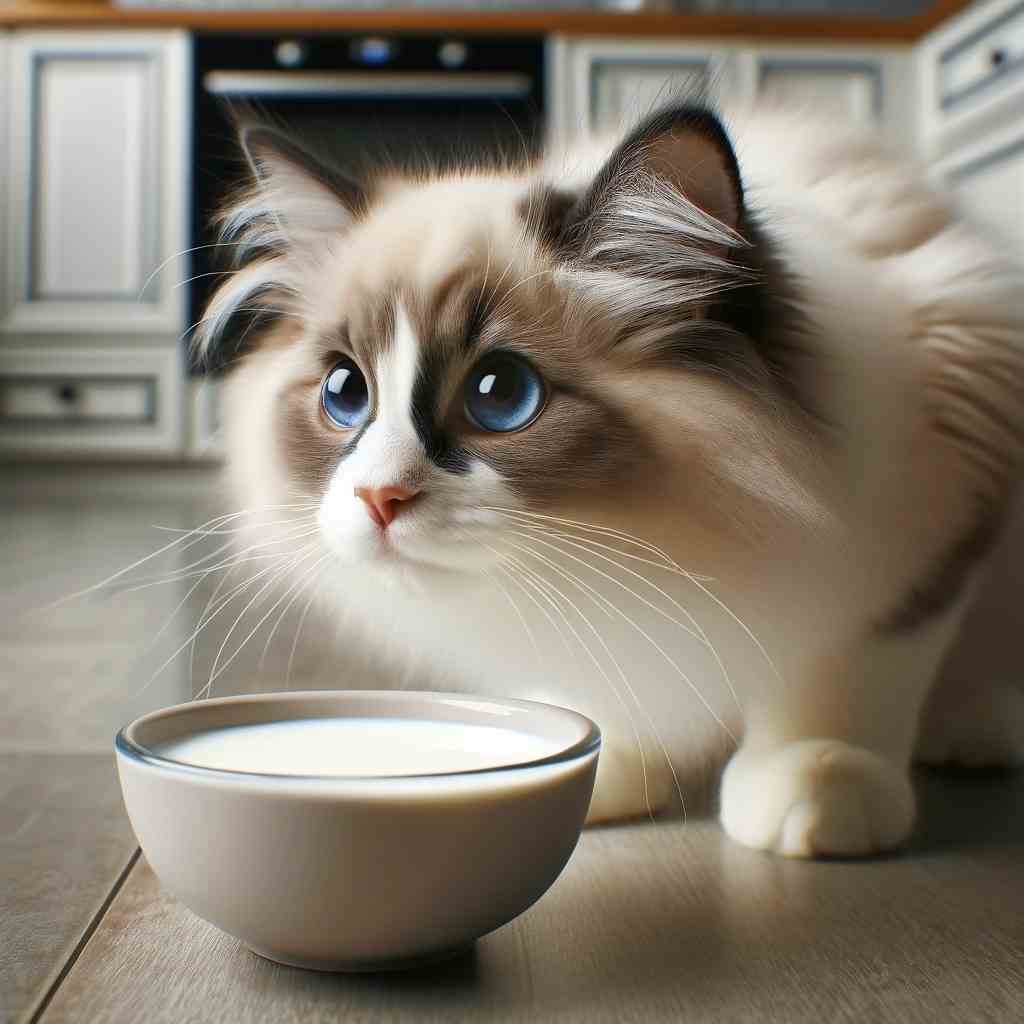As cat owners, we often want to give our beloved pets treats that we enjoy ourselves. One popular item that comes to mind is milk. But what about ragdoll cats? Can they drink milk, and is it safe for them?
In this article, we will explore whether ragdoll cats can safely consume milk and discuss the potential risks associated with their lactose intolerance. Understanding their digestive system and nutritional needs is crucial in ensuring the health and well-being of your feline friend.
The Digestive System of Ragdoll Cats
Ragdoll cats, like all felines, have a unique digestive system that affects how they process different types of food. Understanding their digestive system is crucial in determining their ability to digest milk and other substances and assessing their risk of developing digestive issues, such as lactose intolerance.
The digestive system of ragdoll cats is similar to that of other cats, with several key differences. Their stomachs have a relatively low capacity, which means they can’t eat large meals at once. Instead, they prefer to eat small, frequent meals throughout the day. Also, ragdoll cats have a short digestive tract that causes their food to pass through their system quickly, so they can digest high-protein diets more efficiently than other cats.
Identifying Lactose Intolerance in Ragdoll Cats
Identifying lactose intolerance in ragdoll cats can be challenging, as the symptoms of lactose intolerance can be similar to other digestive issues. Cat owners should look out for signs of indigestion, such as bloating, flatulence, and diarrhea, after their cat consumes milk or dairy products.
If ragdoll cats exhibit any of these symptoms, cat owners should consider changing their cat’s diet and consulting with a veterinarian to prevent further complications.
Feeding Ragdoll Cats a Balanced Diet
Ragdoll cats have specific dietary requirements to maintain optimal health. While milk is not necessary for the overall health and well-being of ragdoll cats, they require a balanced diet of high-quality cat food and access to fresh water at all times.
For owners who wish to provide their cats with a milk alternative, there are several options available that are safe for ragdoll cats. Lactose-free milk, cat milk, and other dairy-free milk alternatives can be incorporated into their diet to provide a tasty treat without the risk of digestive issues.
When feeding ragdoll cats, it is essential to follow best practices to prevent digestive issues. Cat owners should avoid giving their cats table scraps and human food, monitor their cat’s water consumption, and provide them with food that is high in protein and added nutrients to support their overall health.
Do Ragdoll Cats Need Milk in Their Diet?
Many of us grew up with the idea that cats love milk, but is it safe for ragdoll cats? As it turns out, while some cats may enjoy milk, it’s not always the best option for their nutritional needs. Though ragdoll cats are not inherently lactose intolerant, many cats can develop an intolerance to lactose, a sugar found in milk.
So, while milk may not be necessary for a ragdoll cat’s overall health and well-being, certain milk alternatives can help meet their nutritional needs. Switching to other milk-like products may offer a suitable option for cats who enjoy milk or for those who require additional hydration. Some milk alternatives for cats include:
| Milk Alternatives | Description |
|---|---|
| Low-lactose dairy | Dairy products, like lactose-free milk, may include low levels of lactose, making them a more tolerable option for cats with milk intolerance. |
| Non-dairy milk | Non-dairy milk is free from lactose and may be made from various sources, including soy, rice, and oats. However, it is essential to check the labels before giving your cat any non-dairy milk, as some may contain additives that can be harmful to cats. |
| Cat milk | Cat milk is specially manufactured for cats and is low in lactose, making it a safe and suitable alternative to regular milk. |

Recognizing Lactose Intolerance in Ragdoll Cats
As with many mammals, lactose intolerance is common in ragdoll cats. This means that their bodies have difficulty breaking down lactose, a sugar found in milk and dairy products. If consumed, lactose can cause digestive issues such as diarrhea and upset stomachs.
Ragdoll cat owners should be aware of the signs of lactose intolerance, including diarrhea, vomiting, and lethargy, after consuming dairy products. If your cat exhibits these symptoms, it’s important to speak with your veterinarian about alternative dietary options.
Managing the dietary requirements of a lactose intolerant ragdoll cat is crucial for their health and well-being. The inclusion of lactose-free milk and other milk alternatives in their diet can help provide the necessary nutritional requirements without causing digestive problems.
It’s important to pay close attention to your cat’s diet and monitor any changes in their behavior, digestion, and overall wellbeing. By recognizing the signs of lactose intolerance and adjusting their diet accordingly, you can help your ragdoll cat lead a healthy and happy life.
Best Practices for Feeding Ragdoll Cats
When it comes to feeding your ragdoll cat, it’s important to make sure they are getting the right balance of nutrients to keep them healthy and happy. Here are some recommended feeding practices:
- Choose high-quality cat food: Look for cat food that is specifically formulated for your cat’s life stage (e.g., kitten, adult, senior) and meets their nutritional needs. Avoid feeding your ragdoll cat human food as it can cause digestive issues.
- Monitor water consumption: Ragdoll cats should have access to fresh, clean water at all times. They may be prone to urinary issues, so it’s important to encourage them to drink enough water to keep their kidneys healthy.
- Feed smaller, more frequent meals: Ragdoll cats can be prone to digestive issues, so it’s recommended to feed them smaller meals throughout the day instead of one or two larger meals.
- Avoid overfeeding: Ragdoll cats can be prone to obesity, which can lead to health issues such as diabetes and joint problems. Make sure to feed them the recommended portion sizes based on their weight and activity level.
- Avoid feeding milk: As mentioned in Section 1, ragdoll cats can be lactose intolerant, so it’s best to avoid feeding them milk or dairy products. Instead, consider lactose-free milk or milk alternatives if you want to incorporate it into their diet.
Conclusion
In conclusion, it is essential to understand the dietary needs of ragdoll cats to ensure their health and well-being. While milk is a popular treat for cats, it is necessary to assess their individual lactose intolerance and digestive issues, as it can cause harm and discomfort.
We explored the potential risks of lactose intolerance in ragdoll cats and provided guidance on recognizing and managing their dietary requirements. We also discussed safe milk options and alternative ways to meet their nutritional needs.
As responsible cat owners, it is our duty to provide the best possible care for our pets. By following recommended feeding practices, choosing the right cat food, and monitoring their water consumption, we can ensure our ragdoll cats remain healthy and happy.
Q: Can ragdoll cats drink milk?
A: While it’s a common belief that cats love milk, including ragdolls, it’s best to avoid giving them milk altogether. Cats are prone to lactose intolerance, and milk might lead to digestive issues.
Q: Are ragdoll cats lactose intolerant?
A: Yes, adult cats, including ragdolls, are prone to lactose intolerance. Their digestive systems lack the enzyme lactase, which helps in breaking down lactose, the sugar present in milk.
Q: What can happen if I give my ragdoll cat milk?
A: Giving milk to your ragdoll may lead to digestive issues such as diarrhea, as their bodies cannot break down the undigested lactose in the milk effectively.
Q: Can I give my ragdoll cat milk alternatives?
A: It’s best to avoid giving cow milk or nut milk to ragdoll cats. Instead, ensure they have access to fresh water and a balanced diet of dry and wet cat food.
Q: How can I reward my ragdoll cat without giving them milk?
A: If you want to reward your ragdoll, you can give them treats specifically designed for cats. It’s important to pay attention to your cat’s dietary needs and avoid giving them milk.
Q: Should I give my ragdoll kittens milk?
A: It’s best to avoid giving ragdoll kittens milk as well, as their bodies also have difficulty digesting lactose. Always consult a veterinarian regarding the best diet for ragdoll kittens.
Q: Can cats drink milk in general?
A: While cats can drink milk, it’s important to note that many adult cats are lactose intolerant. It’s best to avoid giving them milk and instead focus on providing them with water and a balanced diet.
Q: What should I do if my ragdoll reacts badly to milk?
A: If you notice that your ragdoll’s bowel movements and water consumption are affected after consuming milk, it’s best to keep your cat away from milk and consult a veterinarian if symptoms persist.
Q: Should I add water to milk for my ragdoll cat?
A: It’s best to avoid adding water or preservatives to milk for your ragdoll cat. Instead, focus on providing them with fresh water and a complete and balanced diet to keep them healthy.
Q: Can I give my ragdoll mother’s milk if they are kittens?
A: If a ragdoll kitten is not receiving mother’s milk, it’s important to consult a veterinarian for appropriate milk alternatives or formulas specifically designed for kittens.

Hey guys, My name is Simon Smith. I’m from Canada and live near Victoria
I live with my sweet family and have 20+ Ragdolls of different types. I love them as my children. My profession is as a hotel manager.
I love to keep Ragdolls and grow their breeder case. I have 7 years of experience.
I’m an expert in cat care. So, I’m here to provide you with new information about my cats daily. This is my blog website, so I request that you kindly visit our site daily.
If you’re a Ragdolls lover and you have any questions or confusion about cats, text me on the Contact Us page or Gmail.
Thank u
